Current as of: March 4, 2026 - 16:03
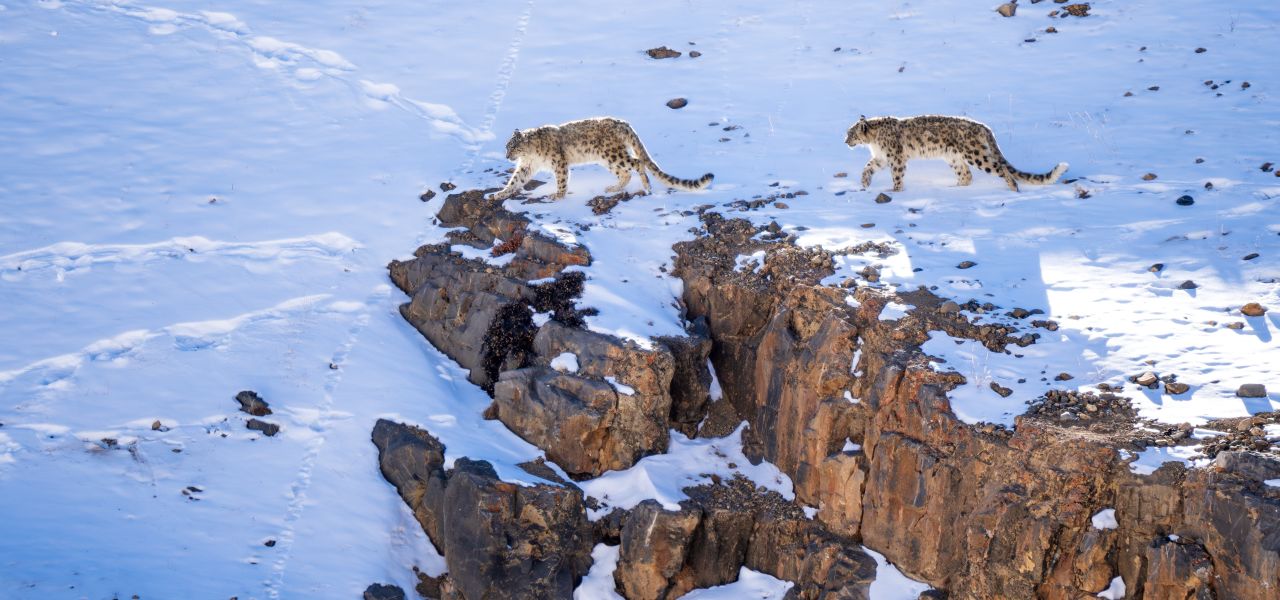
Search for Snow Leopards with Valerie Parkinson Trip Notes
- Ways to Travel: Guided Group
- Destination: India
- Programmes: Walking & Trekking
-
Activity Level:
3 out of 7 - Moderate
- 14 Days: Land Only
- Ages: 16+
- Trip Code: TGL
- Carbon Footprint: 39kg CO2e
Trip Overview
Search for the elusive snow leopard and attend a monastic festival with a true expert of the Himalaya
Snow leopards are one of the most elusive mammals in the world but in winter they descend from the High Himalaya in search of food. As they inhabit some of the most remote and mountainous regions of Central Asia, the mission to see this enigmatic cat is really more of a pilgrimage. Other rare high-altitude wildlife and isolated Himalayan Buddhist communities only add to this quest’s allure. The itinerary varies slightly by departure date to fit in the different festivals. All departures are led by specialist Himalaya trekking guide Valerie Parkinson.
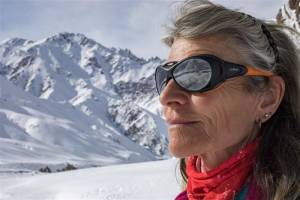
Valerie was born by the seaside in Blackpool, UK, and spent much of her younger days walking with her parents in the Lake District. After finishing her studies, Valerie worked in Germany and Switzerland, until 1984 when she took a break that would change her life forever. She travelled to India for a three-week trek through Kashmir and Ladakh and found her spiritual home in the High Himalaya. She has spent the rest of her life leading treks (and bike trips) in the Himalayan region and her knowledge of the local culture, religion, art and wildlife is second to none. Her enthusiasm for trekking developed into climbing. In 2008, she became the first British woman to summit the 26,781ft (8,163m) tall Mount Manaslu without the use of supplementary oxygen and she attempted Everest in 2009. Over the years, Valerie has been instrumental in setting up and running Himalayan Community Projects, which now operates through the Exodus Travels Foundation.
At a Glance
- Masked dance festival visited on most departures
Highlights
- Chance to see the rare, elusive snow leopard
- Wonderful winter walking in mountainous Ladakh, when it is cut off from the rest of the world
- Visit ancient monasteries and most departures attend a colourful monastic festival with masked dancers
- Enjoy a homestay night and traditional meal with a friendly Ladakhi family
- Look for lynx, blue sheep, wolves, bearded vultures, red foxes, Himalayan griffin vultures and golden eagles
Is This Trip for You?
This trip is rated Activity Level 3 (Moderate). For more information on our trip gradings, visit the Activity Level Guidelines page. If you have any queries about the difficulty of the trip, please contact us.
Trek essentials: This is an adventurous tour, which takes place in winter, when Ladakh is cut off from the rest of the world by road and temperatures drop well below freezing point. The walking distances each day are moderate. Most of the walking is optional dependent on your enthusiasm for tracking animals each day. While out spotting, we have professional wildlife spotters to guide us and one spotting scope for every five clients.
Altitude: This trip spends time above 9,842ft (3,000m); please refer to the Altitude Warning within the Trip Notes for more information and advice on how to limit the effects of altitude sickness.
- Maximum altitude: 14,930ft (4,550m)
- Average altitude: 12,470ft (3,800m)
- • Maximum sleeping altitude: 13,123ft (4,000m)
Flexibility: The tour is designed to maximise your chances of spotting a snow leopard and means you need to be flexible. We may need to adjust or change the itinerary at short notice should snow conditions or other adverse conditions deem it wise to do so.
Accommodation: The hotel in Leh is simple but comfortable and has central heating. Out of Leh, conditions are more basic. Five nights are spent at a base camp, which consists of two-person tents, a dining tent with tables, chairs, lights and heaters, and long-drop toilets. There is a full camp crew and cooks, who look after us. One night is spent in a Ladakhi house, which is heated with a wood-burning stove.
Flights: Internal flights to Leh are operated throughout winter when the weather is clear. Delays and cancellations cannot be ruled out.
Connecting to the internet: Ladakh is ideal if you want to be present and enjoy a digital detox, as there is no coverage across the region. Therefore, we do not recommend that you purchase e-sims or local sims for use during the trek.
Group
All departures are led by Valerie Parkinson, who has spent the last 35 years leading groups in Ladakh and other parts of the Himalaya.
She is supported by local guides/spotters, who are experts on the local wildlife. A full camping crew, including cook and assistants, are also available.
Luggage is carried from the roadhead to base camp by Jeep or mules. You only need to carry your backpack when we are out spotting. It is possible to hire a porter locally to carry any heavy camera gear. Details are in other sections of these Trip Notes.
Adult min age: 16
Min group size: 5
Max group size: 14
Itinerary
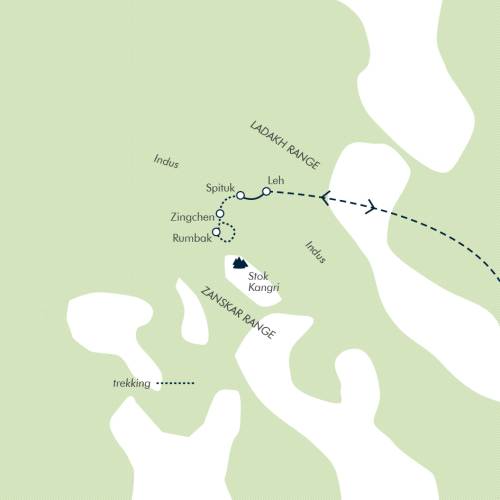
Land Only
- Start City: Delhi
- End City: Delhi
Land Only Itinerary
Our adventure begins in Delhi, a colourful and chaotic city full of architectural masterpieces. You are free today to explore this buzzing city or rest after your flight.
Around 6pm, say namaste to your tour leader and fellow travellers, when we gather as a group for the first time to get to know each other and learn more about the adventures ahead.
Your tour leader then ensures a big welcome by arranging a group dinner at a nearby restaurant.
Want more time in Delhi? Secure pre-tour hotel nights through your sales representative.
Accommodation: Hotel Regent Grand (or similar)
Usually, we have an early start for the flight to Leh. We may have to leave the hotel around 3am and drive to the airport for the very early morning (but highly spectacular) flight over the snow-capped peaks of the Himalaya, which are incredibly beautiful in winter. Landing in Leh, the temperature drops dramatically and we need our down jackets at the airport. If the weather is good and the flight goes on time, we should be in Leh for breakfast. The rest of the day is free to relax and acclimatise to the altitude (11,485ft/3,500m). In the morning, we rest and catch up on sleep. In the afternoon, we have a gentle orientation walk around Leh and its bazaars.
Accommodation: Mahey Retreat (or similar)
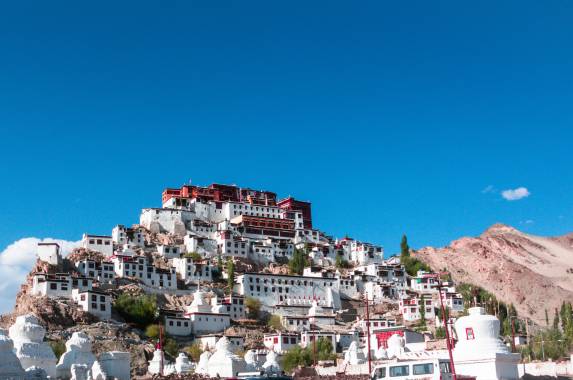
Today we visit the most important monasteries in the Indus Valley. First, we drive just over 30 minutes to Shey, once the residence of the Ladakhi royal family. Below the old palace ruins is a small temple containing a two-storey gilded statue of Buddha. From Shey, we walk across the fields to Tikse, spotting birds en route. Set on a hill, it is one of the most impressive gompas in Ladakh. It has several temples, one of which contains a superb statue of the Future Buddha.
In the late afternoon, we return to Leh.
There may be the opportunity to attend a local monastic festival depending on the lunar calendar. Usually, we time the trips so we can visit a festival on either Day 3 or Day 11, keeping plans flexible. Valerie and our local team will advise what’s possible on the day.
Accommodation: Mahey Retreat (or similar)

Leave Leh and drive across the Indus towards Jinchen. We follow the road past Phe to the entrance of the impressive Rumbak Gorge. We leave the cars near a bridge and our trail takes us up into the narrow gorge and we start our search for evidence of snow leopards and blue sheep. We camp tonight at our base camp at Rumbak Sumdo (12,470ft/3,800m).
Accommodation: Full-service camping
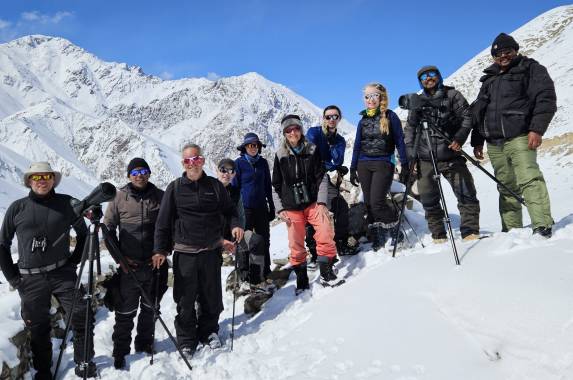
The next five days are dedicated to searching for snow leopards. The itineraries are flexible and set by our expert wildlife guides. They are in touch with other local spotters, who share recent sightings and maximise our chances of seeing a snow leopard – in 2025, we saw seven snow leopards, lots of blue sheep and a lynx.
We usually spend most of the time at our base camp at Rumbak Sumdo, while walks take us into the Rumbak Valley and further towards Yurutse and the Ganda La. We can also explore the Husing and Tarbuns valleys, all well-known haunts of the snow leopard.
Bring a good pair of binoculars to scan the slopes, though we also have wildlife spotters (one per five group members), who carry spotting scopes, which they set up at camp and on ridges on the walks. They also go out in the early mornings and late evenings to search for evidence of any animal movement.
We also have a full trekking crew with us, including guides, assistant guides, cook, kitchen assistants and porters. Lunch and hot drinks are brought to us by our camp crew. If you have a heavy camera bag, it is possible to hire a private porter to carry this for you.
We camp every night, except for one, which is spent in a traditional Ladakhi homestay. Food at the homestay is traditional local fare and you get the chance to interact with the villagers.
Accommodation: Full-service camping and one night in a homestay
Today we trek back to Jinchen, where we meet our transport and drive back to the relative comforts of our hotel in Leh.
Accommodation: Mahey Retreat (or similar)
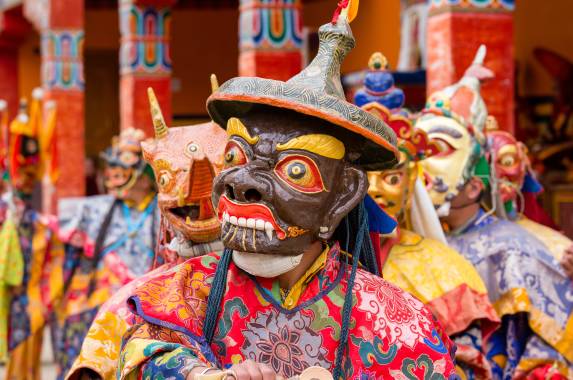
Once a year, every monastery in Ladakh has a festival where the monks dress in elaborate brocade and silk costumes and re-enact century-old stories of the Tibetan Buddhist religion. Valerie and the local team will be able to make arrangements locally if it is possible to attend a festival for those interested.
People come from all over Ladakh to the festivals and these are a great social as well as religious occasion. The whole day is spent at the festival; in the evening, we return to our hotel in Leh.
Please note: the masked dance festivals run on the Tibetan calendar. Dates can and do change. Festivals can be a day earlier or later than advertised due to the moon. We do our utmost to ensure you have the opportunity to visit a festival either on Day 3 or Day 11 where possible.
Accommodation: Mahey Retreat (or similar)
We fly back to Delhi. The rest of the day is free in Delhi for individual shopping or sightseeing.
Accommodation: Hotel Regent Grand (or similar)
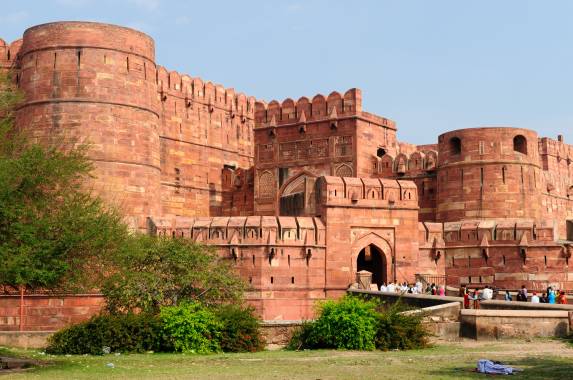
We have a free day in Delhi in case of any delays to the flight from Leh. If we fly to Delhi on schedule, today is free for individual sightseeing. You may want to visit Old Delhi with the magnificent Red Fort and Jami Masjid. Humayun’s Tomb (a forerunner to the Taj Mahal) is worth a visit. In New Delhi, there is India Gate and Parliament House. Delhi also has a wealth of interesting shops and markets.
For those interested, your tour leader can organise a walk around the old part of Delhi. An optional day trip to Agra to see the Taj Mahal can be arranged by your tour leader who will provide details and prices (not available on Fridays, as the Taj Mahal is closed).
Accommodation: Hotel Regent Grand (or similar)
The tour ends after breakfast today and we begin our return journeys home. Alternatively, if you’d like a little more adventure, consider joining our five-day Golden Triangle extension. Encompassing Delhi, Jaipur and Agra, the trip is a whirlwind of culture, taking in the Taj Mahal, Red Fort of Akbar and much more.
Extend Your Trip
Golden Triangle Add-on Tour
A visit to the incredible Taj Mahal and other great Moghul cities close to Delhi is an excellent add-on to a visit to northern India.
The Taj Mahal in Agra was built by the Moghul emperor Shah Jahan in memory of his beloved wife, and is one of the most beautiful sights on earth. Close by is the imposing Red Fort of Akbar with its beautiful courtyards and palaces and let’s not forget the deserted royal city of Fatehpur Sikri. The extension also visits the pink city of Jaipur, capital of Rajasthan, which is one of the most attractive and colourful cities in India.
The detailed itinerary is here, or speak to your sales representative for more details.
Altitude Warning: This trip includes one or more nights over 9,845ft (3,000m) above sea level, where there is a genuine risk of being affected by acute altitude illnesses; if left untreated, this can be life-threatening. Most should expect to experience some mild symptoms of altitude sickness, such as headaches, shortness of breath or sleeplessness. Our leaders are trained to identify symptoms of severe altitude illnesses and, if a customer requires extra care, arrangements such as a rapid descent will be made.
Exodus itineraries are informed by the Wilderness Medical Society (WMS) Guidelines for the Prevention of Altitude Illnesses and designed to allow for adequate acclimatisation. Due to terrain and/or logistical factors, there may be nights where the sleeping altitude gain is more than 1,640ft (500m), increasing the risk. The WMS highlight that because the rates of acclimatisation and physiologic responses to high altitude vary considerably between individuals, the recommendations given, although generally effective, do not guarantee successful prevention. Participants should be aware of the inherent risk posed by altitude.
Several medical conditions or medications can affect a person’s ability to acclimatise, making them more susceptible to acute altitude illnesses. Those with pre-existing conditions, such as heart or lung conditions, those who have suffered with altitude sickness before, or those with concerns about overall physical ability, should consult their doctor before booking. The drug Diamox (acetazolamide) may aid acclimatisation in some individuals. Those considering using Diamox should speak to their doctor about the drug, its suitability, side-effects, and a prescription. Please note, while we endeavour to assist all our customers in achieving their goals, there may be times when a leader decides to delay or stop someone’s ascent based on their condition.
If you are not taking out the Exodus Travel Insurance policy from our partner Campbell Irvine, please make sure your policy covers you up to the maximum altitude on this trip (if trekking in the Himalayas, your policy should also cover the use of a helicopter for emergency medical evacuation).
Accommodation
Hotels, camping and homestay

In Delhi, we use a hotel with air-conditioned rooms. In Leh, we stay in a hotel close to the local market and town centre.
The trek itself is on a full-service camping basis, meaning our camp staff establish the base camp before you arrive. We have camp staff and cook who do all the camp chores. You need only carry your backpack for the day. We use two-person tents, which have enough room inside for your kitbags and include a mattress, sheet, pillow, blanket, and a hot water bottle at night. We also have a dining tent with a table, folding chairs and a heater for use during the evenings. No running water is available while camping. The camp staff collect stream water or melt snow to provide bowls of warm water (to wash with).
We spend one night in Rumbak village, where we stay in a traditional Ladakhi house. The dining room and bedrooms have small wood-burning stoves, and there is electricity available at the homestay to charge your electronic devices.
For both the homestay and camping, there is a basic long-drop toilet available.
Worth knowing
- At the homestay you sleep on a mattress on the floor. The bedrooms have thick mattresses and blankets and you can take your sleeping bag from the camp.
- There is wifi in Leh; however, there is no mobile coverage for international phones in Ladakh
- If you require a single room in Delhi and Leh and a single tent while camping, there is a single supplement. Please note, single rooms are not available in the homestay.
Single supplement from USD 1080
Food & Drink
All breakfasts are included and all food is included in Ladakh. In Leh, the food is a mix of Indian, Tibetan, Chinese and Continental. On trek, we provide a full breakfast including porridge, cereals, eggs and toast and a choice of hot drinks. Lunch is a packed hot lunch consisting of rice and chapattis, vegetables, tuna and cheese, which is carried for us. Dinners are mostly pasta, rice or potato based and a mixture of Indian, Continental and Chinese cuisines. In the afternoon, hot drinks and biscuits are served and, in the daytime, camp staff bring us hot drinks while we are out spotting.
Drinking water
Staying hydrated is important when undertaking any physical activity. However, we strongly encourage you not to buy bottled water as this contributes to the growing problem of plastic pollution in India
On trek, the cooks collect and boil drinking water from the mountain streams and fill up your water bottles for you, but you may need to collect water during the day and may wish to use your own water purification treatment as well. Purification tablets can be an economical way to treat your water, most taking between 30 minutes to one hour to purify one litre of water and are easy to used in water bladders/hydration packs. Purification tablets which contain chlorine dioxide are reported not to leave an obvious taste as other tablets may.
We suggest you may like to bring a reusable bottle with a wide opening and use a Steripen to treat any non-boiled water. A Steripen is a handheld UV water purifier – small, lightweight and battery powered, so easy to pack. It’s quick to use, far more effective than purification tablets, and the water is ready immediately. It’s fine to use a Steripen on non-boiled water so long as it isn’t cloudy or full of sediment (which is uncommon in these regions).
Steripens are widely stocked on Amazon, outdoor shops and other online retailers; look for the latest models but avoid USB charging ones. Models that take lithium batteries are best as they last longer, especially in cold conditions.
Transport
For transfers in Delhi, we use either taxis or private buses (during busy times such as morning rush hour, taxis are preferable to negotiate the busy narrow streets). For all road journeys in Ladakh, we use jeeps.
The flights to and from Leh are on one of the internal airlines operating in India. Please note, flights to and from Leh operate subject to weather. Flights can be cancelled, and you should be aware of this.
Weather & Seasonality
Ladakh in winter is very cold. From January to March, the days can be sunny but there is a chill in the air. January is the coldest month. By March, the days can be up to 7C (45F). The early mornings, evenings and nights are extremely cold. You must be prepared for temperatures well below freezing. Daytime temperatures in Leh and on trek are approximately -10C to 6C (14F to 43F). It is a very dry cold in Ladakh and we can expect sunny weather with a windchill. Nightly temperatures can be -10C to -25C (14F to -13F).
There is usually snow around from January to March. You must be adequately equipped and prepared to deal with the cold on this trip. Please read the equipment section thoroughly.
In Delhi, the weather is mild and pleasant in February with daytime temperatures up to 25C (77F), rising to 30C (86F) in March.
Joining Instructions
Key information
Start hotel: Hotel Regent Grand, 2/6, Pusa Rd, opposite Metro Pillar No. 167, Block 2, East Patel Nagar, Karol Bagh, New Delhi, Delhi 110008, India
Phone: +91 11 4601 1111
Recommended arrival time: You can arrive at any time today. There will be a welcome briefing around 6pm this evening.
Airport: Indira Gandhi International Airport (DEL)
Getting to the start hotel
The start hotel is approximately 35 minutes’ drive from the airport. Exodus provides free arrival transfers to the start hotel from the airport for all customers. If you would like further information on joining this trip, please speak to your sales representative.
Catching your return flight
Exodus provides free departure transfers for all customers to Indira Gandhi International Airport (DEL) from the end hotel.
Leh flight delays
Leh Airport can sometimes experience adverse weather conditions and snow in winter, which can occasionally cause flights to be delayed or cancelled. If booking your own flights, we advise you to book your international flight home from Delhi departing no sooner than mid‐afternoon/evening on the last day of the itinerary. Should you miss your international flight as a result of delays from Leh, your insurance may not cover you for any additional expenses incurred.
Full joining instructions including local emergency numbers will be sent to you as part of our Final Joining Instructions. If you do not receive these at least a week before departure, or require them earlier please contact our office or your travel agent.
Location start: Delhi
Location end: Delhi
What To Take
Essential Equipment
Please note that the checked in luggage allowance on the flight to and from Leh is 33lb (15kg) and 16lb (7/8 kg) hand baggage.
- Four-/five-season sleeping bag
- Four-/five-season jacket
- Sturdy warm waterproof walking boots or breathable snow boots (eg Sorels or Hi-Tec snow boots)
- Warm gloves
- Warm socks
- Fleece jacket
- Thermal tops and bottoms
- Warm trousers (pants)
- Warm insulated shoes/boots for the evenings in camp
- Backpack
- Water bottle
- Water purification treatment
- Personal first-aid kit
- Headtorch (head lamp)
- Waterproof jacket and trousers (pants)
- Gaiters
- Sunhat
- Sunglasses
- Sunscreen
- Warm hat
- Wash kit
- Trekking pole(s)
- Toilet paper
- Plastic bags to line backpack and kitbag
- Refillable water bottle
Local equipment hire: It’s possible to hire a five-season sleeping bag, five-season jackets, and trekking poles in Leh. These are delivered to your hotel in Leh and returned in Leh. Equipment hire can be requested in advance either through our customer operations team or on arrival in Delhi with your leader. Payment is required locally. You can also request items on arrival in Leh but these are subject to availability.
The costs for the local hire are approximately:
- Five-season sleeping bag: 5,600 rupees (US$65)
- Five-season down jacket: 4,500 rupees (US$52)
Equipment hire partners: We have partnered with the following outdoor specialist for great rates on expedition kit hire (UK-based customers only) or just general advice and guidance on the best kit and equipment needed for your trek.
- TrekHire: Offers Exodus customers a four-week hire period for their technical gear, including items such as down sleeping bags (which includes cleaning costs). This extended hire period gives you ample time to prepare and return your gear after your trip. TrekHire also provides assistance with reviewing your kit list, offering advice on how to use your gear, and recommending what to buy or avoid. Additionally, they own a shop called Surrey Trek and Run, where you can enjoy a 10% discount on in-store items (excluding walking boots).
- Expedition Kit Hire: Offers a 10% discount on hire prices for Exodus customers (excluding already discounted pre-made package deal kit lists, such as those for Kilimanjaro and Everest Basecamp). For extended hires (beyond the standard two-week hire), they offer a reduced daily rate, which often provides savings greater than 10%. Please ask our Customer Operations team for the Exodus customer discount code.
If you have any space in your luggage, please check out our partner Pack for a Purpose (www.packforapurpose.org) to identify items needed by local schools and medical clinics. Your Tour Leader will happily assist with your donation.
Exodus kitbag: If you book this trip, we provide a free Exodus kitbag to pack your luggage in while on trek. Once you have booked, you will be sent instructions on how to claim your bag (they are not sent automatically). Please note, if you book less than three weeks before the departure date, we cannot guarantee your kitbag will arrive before your trip starts. If this is the case, please contact us on customerops@exodus.co.uk (or customeroperations@exodustravels.com if you’re based in the US or Canada). See www.exodus.co.uk/kitbags for full T&Cs.
Optional Equipment
- Buff/scarf
- Thermos flask
- Pee bottle
- Hand washing gel
- Bio-degradable soap and shampoo
- Micro Spikes/Grivel instep crampons/Yaktrax or similar for those who are not used to walking on snow (these are highly recommended)
- Good pair of binoculars is highly recommended (the guide carries a spotting scope but you will find a pair of binoculars useful for scanning ridges and slopes). If you have a spotting scope, you may want to bring it with you
Prohibited items to travel with in India
- The Indian government has banned e-cigarettes and related products. You can’t buy e-cigarettes in India or bring them into the country. Please ensure you do not pack these in your luggage.
- Satellite communications devices, for example (but not exclusively) Garmin inReach or any other brand GPS tracking device, are illegal in India without a license. Please do not bring them with you.
Spare space? If you have room in your luggage, consider bringing items to donate to care homes, schools and villages − your tour leader can assist in delivering them once you’ve arrived.
Much-need items included:
- Second-hand clothing in good condition
- School stationery, including pens, pencils, crayons, erasers, rulers and notebooks
- Card games
- Balls, including (deflated!) footballs and tennis balls
- Toiletries, including toothpaste, toothbrushes and soap
Practical Information
Visa
To avoid possible problems at immigration, make sure your passport is valid for a minimum of 180 days at the time of entry into India.
Travellers from the UK, US, CA and EU normally need a visa to enter India. Please note, visa requirements often change and it is your responsibility to obtain any required visas for this trip. Therefore, we recommend that you check with the nearest embassy or consulate of your chosen destination(s), including any countries you may be transiting or transferring through.
Some local governments provide guidance on what visas their citizens need. To help, we’ve gathered a selection of useful links below.
• Australia: www.smartraveller.gov.au/destinations/asia/india
• Canada: www.travel.gc.ca/destinations/india
• United Kingdom: www.gov.uk/foreign-travel-advice/india/entry-requirements
• USA: www.travel.state.gov/content/travel/en/international-travel/International-Travel-Country-Information-Pages/India.html
Travellers eligible for an e-visa, which includes those from the UK, US, CA and EU, can apply at www.indianvisaonline.gov.in/evisa/tvoa.html.
For more information on applying for your Indian Visa, including details required for your start hotel and local reference contacts, please click on this link: Indian Visa Information
Please note: If your trip visits Ladakh, in the very north of India, or Sikkim in the northeast, do not mention this on your Indian visa application. This can sometimes slow down or even cause the embassy to reject your visa.
New Digital Arrival Card
Travellers from the UK, US, EU and Canada must also complete a Digital Arrival Card. This can be filled online up to 72 hours before arrival via the official Indian visa website https://indianvisaonline.gov.in/earrival/. This is separate from the Indian e-visa process and this remains the same. Physical cards will remain at the arrival airport until 1 April 2026, at which point the Digital Arrival Card will be made mandatory.
Vaccinations and Health
India
There are no required vaccinations. However, you may want to consider vaccinations for tetanus, hepatitis A, typhoid, cholera, hepatitis B, Japanese encephalitis, rabies and tuberculosis. The risk of malaria is slight, but you may wish to consult your doctor or travel clinic for further advice.
You will also require a yellow fever vaccination certificate if arriving from a country with risk of yellow fever transmission. Proof of a polio vaccination may also be required by some travellers. Please confirm all requirements and recommendations with your doctor or travel clinic.
Additionally, dengue, a viral disease spread by mosquitoes, is a known risk in India. There is currently no vaccine or prophylaxis available, so we strongly recommend you take the usual precautions to avoid mosquito bites.
Some of our India trips spend time at altitude. In regions over approximately 6,560ft (2,000m), there is little risk of mosquito-borne diseases. For trips above 9,840ft (3,000m), there is a risk of being affected by acute mountain sickness. Our itineraries are designed to enable everyone to acclimatise to these altitudes, but you should be aware that it is still possible for you to be affected. Please see the Trip Notes for further information.
The risk of malaria on this trip is slight, but you may wish to consult your GP or travel health clinic for further advice.
Local Time
India's time zone: Asia/Kolkata (UTC +05:30)
Electricity
There are recharging facilities at the hotels in Delhi and Leh. We have a small generator at camp where you can charge batteries.
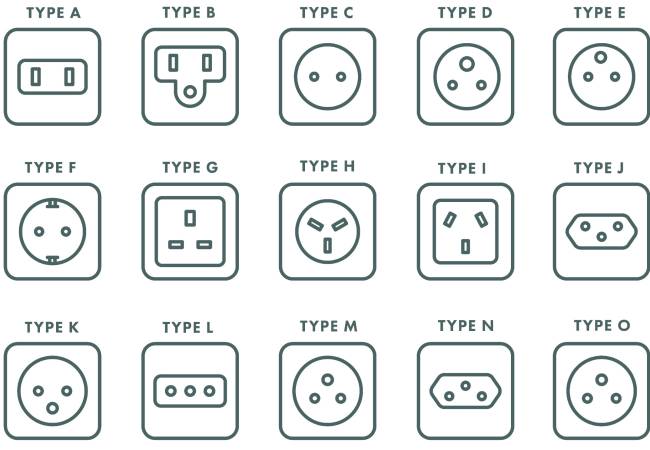
Money
India's currency: Indian rupee (INR). Please note, it is illegal to import or export rupees. Do not accept torn or very dirty Indian banknotes from banks or in change as they will almost certainly not be accepted as legal tender in India. You can normally change money back from rupees into US dollars or British pounds at the departure airport, but you must produce an exchange receipt showing that you changed money in India.
ATM Availability
There are ATMs in Delhi and Leh. Please do not rely on ATMs as they are often out of order or run out of cash and there is a limit on how much you can take out per day. Even if you have told your bank you are travelling to India, many banks block cards used in Indian ATMs. We recommend you bring most of your money in cash and ask your leader where the best place is to change it. Credit cards are accepted in larger shops in Delhi. There are some shops open in Leh in winter but we recommend you take cash to spend in Leh.
Extra Expenses & Spending Money
There is not a lot to spend money on, apart from lunches and dinners in Delhi. Allow approximately 6,230 rupees (US$75) for meals in Delhi. The hotel in Leh sometimes has beer and cold drinks. Safe boiled water is provided for drinking.
If you have heavy camera gear or would like your camera gear to be carried for the trek, it is possible to hire a special porter to carry your camera pack and help with the camera. The cost is 14,000 rupees (US$165) for the six days out of Leh. Please let us know if you would like us to arrange a special porter for you at least four weeks before departure/when booking; this must be booked in advance but paid for locally in India.
India has very good opportunities for shopping, especially for locally made goods. During your trip, it is highly likely your local guides will take you to emporiums and workshops where these goods are made. Many people find this a great opportunity to buy local handicrafts, silk, jewellery and carpets. Guides often assume visitors want to go shopping, it is very much part of the culture, but if you do not wish to go, please make this clear to your local guide at the time.
Tipping
Tipping is customary in India and usually expected. Tipping can often be an awkward affair, especially when in an unfamiliar country where you are not sure when or how much to tip. As such, your tour leader will offer to arrange and look after a group tipping kitty, which will be used to tip hotel staff, local sightseeing guides, drivers and any other support staff used throughout your trip. Your leader will suggest how much to contribute, depending on group size, but it is usually around 6,500-7000 rupees (approximately US$80-US$85) total per person for this trip. At any time during the trip, your leader will happily show you an account of how the kitty is being distributed. Please note, for smaller groups the leader may have to collect more than the above amount.
Tipping of leaders is not included in the kitty and is at your own discretion. If you wish to show your appreciation a tip of around 3,000 rupees (US$35) per person would be appreciated. By definition, gratuities are not something that can be included in the tour price.
Sustainability and Impact
As a certified B Corp, we’re on a mission to improve our social and environmental impact across all our adventures.
We do this through our innovative Thriving Nature, Thriving People plan.
This ‘nature positive’ approach is designed to help nature and communities thrive in harmony through practical solutions, such as reducing carbon and waste on our trips, supporting conservation projects through the Exodus Adventure Travels Foundation, and rewilding 100 square metres for every Exodus traveller.
You’ll also find Thriving Nature, Thriving People moments across our trips. These experiences are often a highlight of your adventure, while also benefiting the natural world or local communities.
On this trip, we:
- Stay in Ladakhi homestays in Rumbak village, supporting local households while sharing traditional food and everyday village life.
In addition, we support local initiatives in this region through our Foundation’s Himalayan Community Project.
This trip goes near an area deemed unsafe to visit by the UK government’s Foreign, Commonwealth and Development Office, whose advice we follow when operating our trips. While our itinerary doesn’t go to these areas, you should familiarise yourself with your local government’s advice if you are planning any pre- or post-trip travel. Any independent travel to areas currently against your local government advice is entirely at your own risk and unlikely to be covered by your travel insurance.
Important Information
Your Safe Participation
When booking this trip, you should be confident in your ability to participate in all activities described in these Trip Notes. If you have any doubt about your suitability, please call us and ask to speak to one of the experts on this itinerary.
Although our leaders are well trained to deal with different capabilities, if they have any concerns about someone’s ability to safely take part in an activity, or their impact on other people’s enjoyment, we authorise them to take necessary action which, in some circumstances, may involve asking someone to miss that activity.
By booking this trip you agree to our Booking Conditions which clearly state that our leaders have the authority to do this. In these rare instances we will ensure anyone sitting out is safely provided for and offered alternative options where possible. Refunds will not be provided for activities missed and customers may be liable for additional costs incurred.
Seatbelts
All vehicles used by us should be equipped with working seatbelts, except where approved by us based on the vehicle type or journey. Wherever seatbelts are available, we require our customers to use them for their own safety, even where it may not be a legal requirement.
Travel Safety
For additional information please have a look at the travel safety advice page on our website.
How to Book
Speak to our friendly team of experts to plan your adventure:
- Check availability: our website shows real-time availability of our guided group tours, or contact our team by phone, email or live chat.
- Hold a space: You can provisionally hold a space on any guided group tour to give you time to finalise your travel plans.
- Confirm your booking: Payment of a deposit will complete your booking and secure your place on the trip.
After booking
You will receive a confirmation document and invoice, which includes extra information and guidance about your travel arrangements. Our dedicated Customer Operations team will help you with any pre-travel questions or arrangements and can easily add extensions or extra accommodation to your booking. Final Joining Instructions will usually be sent out two to three weeks prior to departure.
Adding transfers to your booking
If you have arranged your own flights and would like to add transfers to your booking, please provide your arrival and departure details to our Customer Operations team around four to six weeks before departure.
- Where free transfers are included, they are available for any flight but can only be added to your booking once we have received your flight schedule.
- Where group arrival and departure transfers are available, these operate at fixed times. You will need to arrive in time to meet the scheduled transfer. If the timings don’t align with your travel plans, our team can arrange private transfers once they receive your flight schedule.
Trip Note validity
Trip notes may be updated after booking; if any updates significantly impact the inclusions or itinerary you will be advised in writing. A link to the most up-to-date Trip Notes will be sent out with your Final Joining Instructions before departure.
The information in these Trip Notes is given in good faith. All holidays can be subject to unexpected changes, and occasionally it may not be possible to follow the itinerary as planned. In these circumstances we will make the best-possible alternative arrangements that maintain the integrity of the original itinerary.

